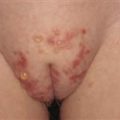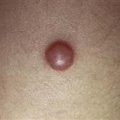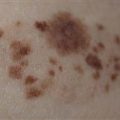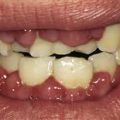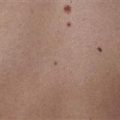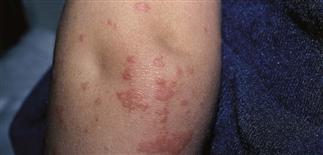
Grouped and linear papules around the elbow in a child with EBV-related Gianotti–Crosti syndrome.
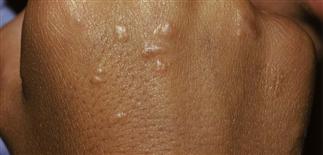
Gianotti–Crosti syndrome. Skin-colored flat-topped papules on the back of the hand.
CLINICAL FEATURES
Gianotti–Crosti syndrome (papular acrodermatitis) is characterized by groups of flat-topped papules in acral areas. They may be erythematous or skin colored. The lesions can vary markedly in size between affected individuals, but are relatively monomorphic in a given child. Involvement of the cheeks, buttocks and limb with prominence over the hands, elbow and knees is usual, but the eruption may be more widespread. The trunk may occasionally be involved, but the scalp and mucous membranes are spared. The degree of pruritus is quite variable. The eruption was initially described in relationship to hepatitis B virus in Italy, but in the United States infection with EBV predominates, although many other viruses and immunizations have been associated. In some cases the rash is preceded by low-grade fever and mild upper respiratory tract symptoms. Generalized lymphadenopathy and hepatosplenomegaly are rare. The eruption is chronic, lasting 2–8 weeks.
TREATMENT
The lesions resolve spontaneously and treatment does not alter time to resolution. Antihistamines and mid-potency topical steroids may help with pruritus.

